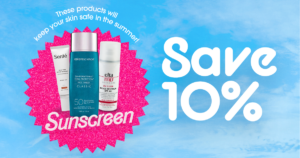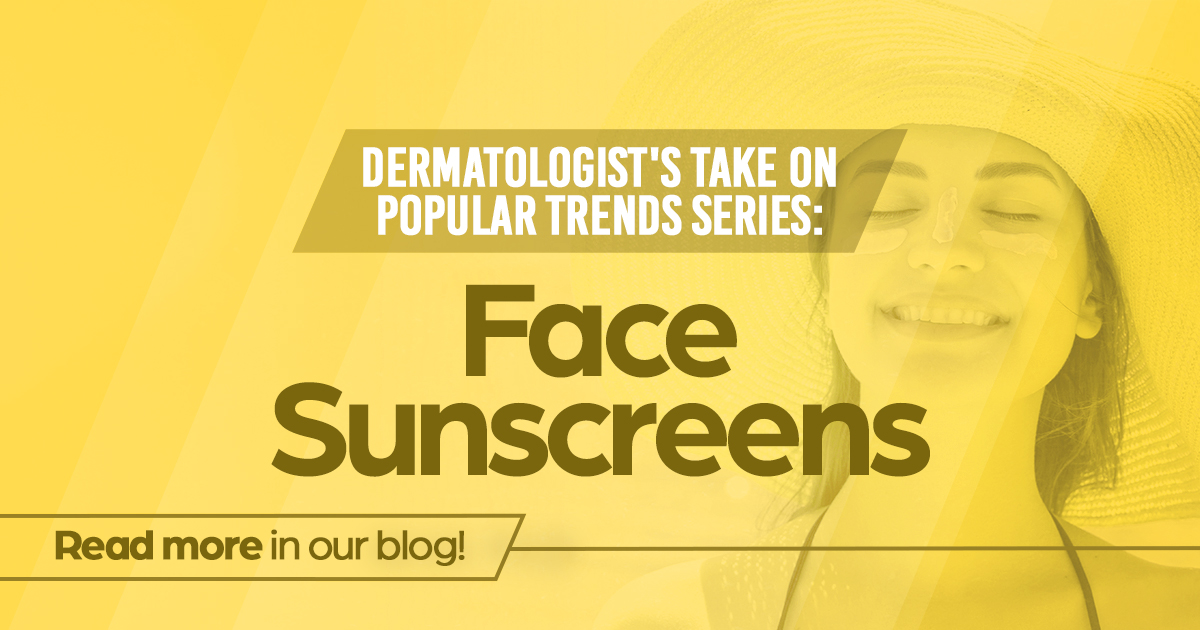As summer’s radiant rays beam down on us, it’s essential to understand the importance of safeguarding our skin from harmful UV rays. With an ocean of sunscreen options available, selecting the right one for our unique skin types and needs can be overwhelming. Fret not, as Dr. Fricke will address the important questions and share invaluable tips to ensure you enjoy the sun responsibly while maintaining a healthy, glowing complexion. So, let’s delve into the world of face sunscreens and unlock the secrets to a sun-safe and beautiful you!
What ingredients should you look for in face sunscreens?
Dr. Fricke: There are two types of sunscreens: organic (chemical) and inorganic (physical, also known as mineral). Chemical sunscreens are powered by active ingredients like avobenzone, octisalate, octocrylene, homosalate, oxybenzone, and octinoxate to absorb and prevent harmful UV rays from entering the epidermis. Meanwhile, physical sunscreens include active ingredients consisting of zinc oxide and/or titanium dioxide and work by reflecting and scattering the UV rays.
The best type of sunscreen is the one you will use again and again. But in general, I recommend physical sunscreens for those with sensitive skin. The downside, however, is that they tend to leave a white cast on the skin. Chemical sunscreens are generally easier to rub in. Either way, the American Academy of Dermatology recommends that everyone use sunscreen that offers the following:
Another ingredient to consider having in your face sunscreen is iron oxide. This is found in tinted sunscreens and can protect your skin against visible light. Visible light can cause skin darkening, also known as hyperpigmentation, particularly for people with darker skin tones.
Does it change person to person?
Dr. Fricke: When choosing a face sunscreen, you should take into consideration your skin type (sensitive, dry, acne-prone, oily, etc.) If you have dry skin, look for cream-based sunscreens that contain added moisturizing ingredients, such as glycerin or hyaluronic acid. If you have oily or acne-prone skin, you could choose a lotion, serum, or gel formula that is “oil-free” and “non-comedogenic,” meaning it won’t clog pores. Avoid heavy sunscreens that are more likely to clog pores, as well as ingredients like plant butters and oils. If you have sensitive skin, I recommend a physical sunscreen in a cream-based formulation that is fragrance-free.
How high of an SPF is necessary?
Dr. Fricke: I recommend using a daily sunscreen with an SPF of 30 at minimum. But I often prefer an even higher SPF when spending a significant amount of time outdoors for added protection.
How often should you reapply?
Dr. Fricke: Sunscreen should be reapplied at least every 2 hours and after sweating or swimming. Powder sunscreens are a great way to reapply sunscreen without feeling like you are caking on more and more layers of cream on your face. They are typically physical sunscreens that resemble setting powders. However, I recommend them solely for purposes of reapplying and not as your primary form of sunscreen.

Is using a makeup product with SPF enough, or do you need to use an additional face sunscreen?
Dr. Fricke: Using a makeup product with SPF as your primary form of sunscreen is often not enough. The amount of product necessary to achieve the SPF listed on the label is ¼ to ½ a teaspoon for the face and front of the neck. People often don’t apply this amount of makeup on their faces and therefore are not getting the sun protection they think they’re getting. Bottom line: It’s not reliable enough. I recommend using a separate sunscreen product underneath your makeup.
Does the order of whether you put sunscreen on first or after other products matter?
Dr. Fricke: Sunscreen should be the last step in your skincare routine (and before makeup, if any).
Do you have favorite brands of face sunscreens?
Dr. Fricke: I have so many favorites! Here are just a few of them.
How would you rate this trend on the glow-up scale: 0-5?
Dr. Fricke: 5!!! The daily use of sunscreen decreases the incidence of melanoma, the deadliest form of skin cancer, as well as non-melanoma skin cancers. Anyone can get skin cancer, regardless of age, gender, or skin tone. Sunscreen also prevents premature skin aging, such as fine lines, wrinkles, and sunspots. And no amount of skincare can overcome these effects of the sun. Thus, sunscreen is the foundation of any good anti-aging skincare routine.

If there’s one thing you should never forget – it’s sunscreen! Both our Alamo Heights and Bulverde locations are currently offering 10% off all sunscreens. Come shop in-store today! Protect your skin and stay on top of your skin checks by scheduling an appointment with our dermatologists on our website.


